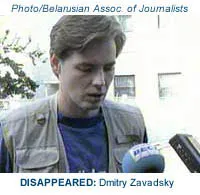New York, July 6, 2001 On the one-year anniversary of cameraman Dmitry Zavadsky’s disappearance in Minsk, CPJ deplores the fact that Belarusian authorities have made little or no progress investigating the case, despite credible leads that have emerged over the past year.
“The absence of concrete progress leads us to suspect that Belarusian authorities are not interested in getting to the bottom of this disturbing case,” said CPJ executive director Ann Cooper. “Once again, we call on President Aleksandr Lukashenko to appoint an independent prosecutor with the authority and political will to investigate the case and bring the perpetrators to justice.”
Zavadsky was a cameraman with the Russian public television network ORT. He disappeared on July 7, 2000, when he failed to keep a scheduled late-morning rendezvous with his longtime friend and colleague Pavel Sheremet at Minsk Airport. Local media later reported that Zavadsky had been seen in the airport not long before Sheremet’s flight arrived from Moscow. Zavadsky’s car was later found locked and parked outside the airport building. Police and officials from the prosecutor’s office searched for the journalist, but turned up no clues.
Murky motive
The motive for Zavadsky’s abduction remains unclear to this day. Zavadsky was once President Lukashenko’s personal cameraman, but his later work was often critical of the Belarusian government. Zavadsky and Sherement had previously been jailed for illegally crossing the Belarusian-Lithuanian border while filming an exposé of Belarus’ lax border security measures. Some sources have alleged that Zavadsky was abducted because he had footage that showed Belarus security forces fighting alongside rebel forces in Chechnya.
Sheremet and Zavadsky’s wife told reporters that shortly after Zavadsky returned from an assignment in Chechnya, he began receiving phone calls from an unknown man who insisted on a meeting. Two men were spotted trailing the journalist near his apartment building on the day he disappeared, Zavadsky’s neighbors told police.
In August 2000, police classified Zavadsky’s disappearance as a premeditated crime and arrested a former army officer named Valery Ignatovich, who remains the government’s prime suspect. Ignatovich was a member of the Belarusian branch of the ultra-rightist Russian National Unity movement. He once served as an officer in the elite Almaz special forces unit.
Revelations
Last month, two former employees of the Prosecutor-General’s Office alleged that President Lukashenko had derailed the investigation because of evidence linking a government-led death squad to Zavadsky’s murder. Dmitry Petrushkevich and Oleg Sluchek made these allegations in two separate personal statements released via email on June 11. They repeated the allegations in videotaped personal statements that aired June 16 on the Moscow-based NTV television network.
Petrushkevich claimed that in November 2000, security officials arrested Dmitriy Pavluchenko, commander of an elite Interior Ministry rapid reaction unit who was familiar with Zavadsky’s disappearance and had told investigators where the journalist’s body was buried.
But as the investigators prepared to examine the site, near a cemetery in northern Minsk, they were apparently ordered to stop their search and release Pavluchenko. Soon thereafter, the prosecutor general was removed from his post, as was the local KGB chief, who was also involved in the investigation.
Sluchek alleged that Viktor Sheyman, the former secretary of the State Security Council, had organized the death squad that allegedly abducted Zavadsky and eliminated several of Lukashenko’s political opponents. Sheyman has since been named prosecutor general, and is currently in charge of the Zavadsky investigation.
Via e-mail, Petrushkevich and Sluchek have released internal documents from the Prosecutor General’s office that support some of their allegations. Both men were recently granted asylum in the U.S.
END
